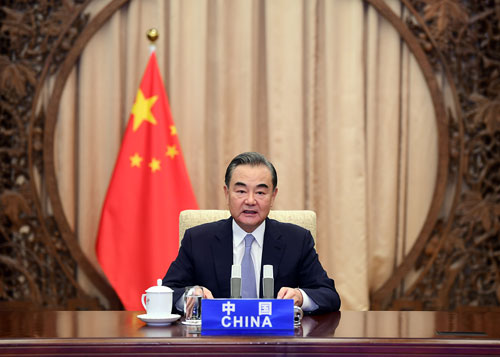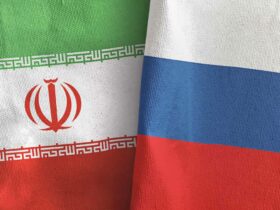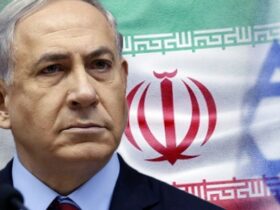The Chinese Foreign Minister Wang Yi is continuing his trip through the Middle East. The visit started on March 24 in Saudi Arabia and continued on March 25 in Turkey, where Wang met with President Erdoğan and Foreign Minister Çavuşoğlu.
On March 26, Foreign Minister Wang travelled to Iran for a 2-day stop. After Iran, Wang will visit United Arab Emirates, Oman and Bahrain to conclude a 6-countries visit.
Accompanying the trip of Wang through the Middle East, the Chinese Foreign Ministry presented a 5-point-plan to “achieve security and stability in the Middle East” on the 26th of March, 2021.
The plan rejects accessing the Middle East “through the lens of geo-competition” and proposes political settlements for Syria, Yemen and Libya; touches on the two-state-solution in the Palestine Question; discusses JCPOA and sanctions on Iran; discusses tensions in the Persian Gulf and highlights economic cooperation in face of the COVID-19 crisis.
The plan is presented as part of an “initiative” launched by State Councilor and Foreign Minister Wang Yi.
United World International documents the 5-point plan below as presented by the Chinese Foreign Ministry via its Embassy in Israel.
State Councilor and Foreign Minister Wang Yi Launches Initiative on Achieving Security and Stability in the Middle East
With many hotspots and complex issues, some of which being highly contentious, the Middle East has a bearing on global security and stability. All stakeholders in the international community ought to play a positive role for the security and stability of the Middle East. China wishes to propose the following:
First, advocating mutual respect. The Middle East is home to unique civilizations which have cultivated unique social and political systems. The characteristics, models and paths of the Middle East must be respected. It is important to change the traditional mindset and see Middle East countries as partners for cooperation, development and peace, instead of simply perceiving the Middle East through the lens of geo-competition. It is important to support Middle East countries in exploring their own paths of development, and to support regional countries and their peoples in playing a major role in pursuing political settlement of such regional hotspot issues as Syria, Yemen and Libya. It is important to promote dialogue and exchanges among civilizations to achieve peaceful coexistence of all ethnicities in the Middle East. China will continue to play a constructive role to this end.
Second, upholding equity and justice. Nothing represents equity and justice in the Middle East more than a sound solution to the question of Palestine and earnest implementation of the two-state solution. We support active mediation by the international community toward this objective and holding an authoritative international meeting on this matter when conditions are ripe. In its presidency of the UN Security Council this May, China will encourage the Security Council to fully deliberate on the question of Palestine to reaffirm the two-state solution. We will continue to invite peace advocates from Palestine and Israel to China for dialogue. We also welcome Palestinian and Israeli representatives to China for direct negotiations.
Third, achieving non-proliferation. Based on the merits in the evolution of the Iranian nuclear issue, relevant parties need to move in the same direction with concrete actions, and discuss and formulate the roadmap and time frame for the United States and Iran to resume compliance with the JCPOA. The pressing task is for the US to take substantive measures to lift its unilateral sanctions on Iran and long-arm jurisdiction on third parties, and for Iran to resume reciprocal compliance with its nuclear commitments, in an effort to achieve early harvest. At the same time, the international community should support efforts by regional countries in establishing a Middle East zone free of nuclear weapons and other weapons of mass destruction.
Fourth, jointly fostering collective security. In promoting security and stability in the Middle East, the legitimate concerns of all parties should be accommodated. It is important to encourage equal dialogue and consultation, mutual understanding and accommodation and improved relations among Persian Gulf countries. It is imperative to resolutely combat terrorism and advance deradicalization. China proposes holding a multilateral dialogue conference for regional security in the Persian Gulf region in China, to explore the establishment of a Middle East trust mechanism, starting with such subjects as ensuring the safety of oil facilities and shipping lanes, and to build step by step a framework for collective, comprehensive, cooperative and sustainable security in the Middle East.
Fifth, accelerating development cooperation. Enduring peace and security in the Middle East requires development, cooperation and integration. It is necessary to come together to defeat COVID-19 and achieve economic and social recovery as soon as possible. It is important to help post-conflict countries rebuild, support greater diversity in the economic growth of oil producing countries, and assist other Middle East countries in achieving development and revitalization, in light of the resource endowments of different countries in the region. China will continue to hold the China-Arab Reform and Development Forum and the Middle East Security Forum to increase the sharing of governance experience with Middle East countries.
China has signed documents on Belt and Road cooperation with 19 Middle East countries and carried out distinctive collaboration with each of them. China is working with all regional countries in fighting COVID-19. It will deepen vaccine cooperation in light of the needs of regional countries and discuss with them trilateral vaccine cooperation with Africa. As it fosters a new development paradigm, China is ready to share with Middle East countries the opportunities of the Chinese market, work with Arab countries to actively prepare for the China-Arab states summit, promote high-quality Belt and Road cooperation and expand new areas of growth such as high and new technologies. We also look forward to early conclusion of a free trade agreement with the Gulf Cooperation Council.

















Leave a Reply